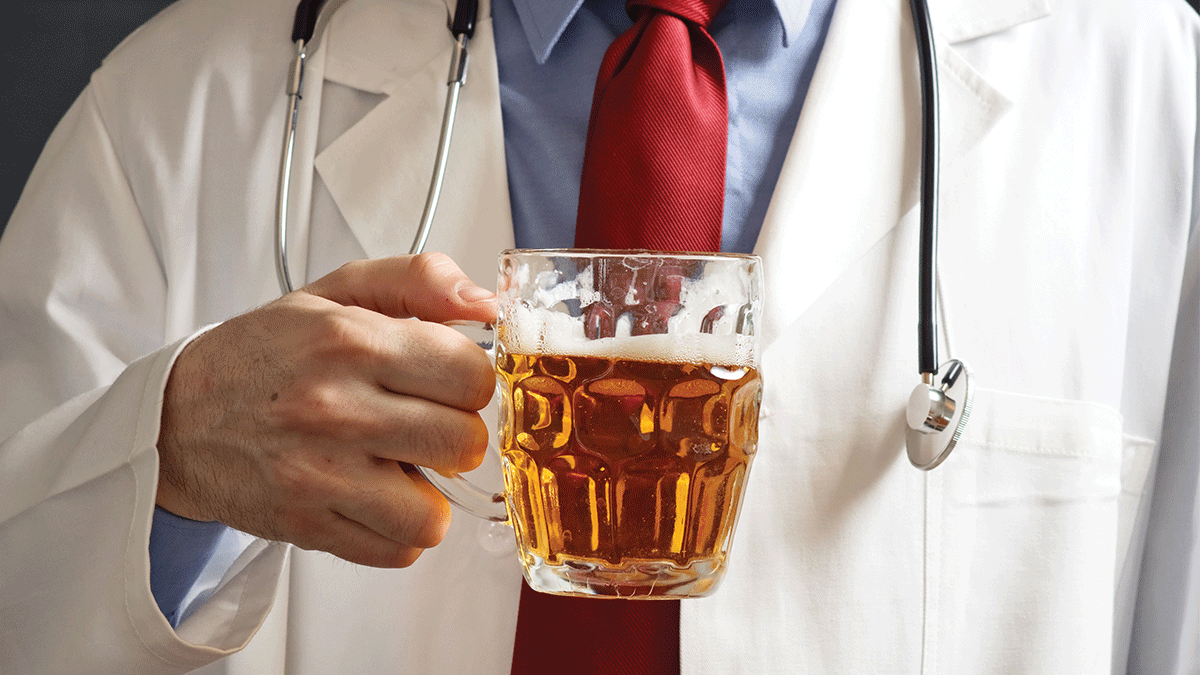“Here’s to alcohol: the cause of—and solution to—all life’s problems,” proclaimed the animated poet Homer Simpson. His thoughts on the matter may be closer to the truth than perhaps even he realized. Alcohol certainly does have a side as dark as a shot of Fernet: it is an all-too-commonly abused drug, plays a role in many car crashes and violent crimes, and can have disastrous and fatal consequences on health. But there is also scientific evidence that consuming it moderately may enhance well-being.
The Harvard School of Public Health’s website comes eerily close to agreeing with Homer, stating, “It’s safe to say that alcohol is both a tonic and a poison. The difference lies mostly in the dose.” So exactly how much should we be drinking? Where is the line between tonic and poison?
One of the first people to look at the question from what he called a “tight, defensible scientific perspective” was Dr. Wells Shoemaker, a local physician and co-author of the book The French Paradox and Beyond, published in 1992, just after the term “French Paradox” entered our lexicon. It refers to the finding that even though French people typically ate diets rich in saturated fats from things like butter and cheese, their incidence of heart disease was surprisingly low. One proposed explanation was that the French also consumed a lot of wine. Could this resolve the seeming paradox?
The answer, according to Shoemaker, is yes. “The alcohol molecule itself has a number of salutary effects,” he says. “It raises [good] HDL cholesterol, lowers [bad] LDL cholesterol, and reduces the tendency of platelets in the blood to clump together.” Wine also offers benefits: “There are a number of antioxidant compounds in wine, mostly in the skins”—which is why red wine is healthier—“that slow damage inside blood vessels,” says Shoemaker, referring to polyphenols like anthocyanins and resveratrol.
He says the timing and manner of how wine is often imbibed is crucial, too. “Typically, wine is consumed with a meal. While fats are being metabolized, the antioxidants are getting into the blood as well, and it is often consumed slowly, in integrative settings that have a social aspect.” Even famed (and French) 19th-century chemist and biologist Louis Pasteur was a proponent of wine, saying, “Wine is the most healthful and most hygienic of beverages.” “So it’s really not a paradox at all,” continues Shoemaker. “Moderate drinking does lower the risk of heart disease and stroke.”
But what exactly constitutes “moderate drinking?” For some, that term is itself the paradox, and unfortunately nine drinks on Saturday night and none the rest of the week does not count. Shoemaker says that the definition has slowly come down over the last two decades, and now sits at about two standard (12-ounce beer/5-ounce wine/ 1.5-ounce liquor) drinks per day for men, and one standard drink per day for women.
A 2017 study published in the British Medical Journal showed a reduced risk of heart disease for moderate drinkers relative to both those who didn’t drink at all and those who drank heavily. And 2015 research at the American Society of Human Genetics used DNA markers to look at alcohol’s effect on aging, and found that moderate drinking was correlated with the healthiest aging.
But a 2016 systematic review published in the Journal of Studies on Alcohol and Drugs looked at 87 previous studies and found that they all showed a reduced mortality risk for low-volume drinkers. After adjusting for insufficiently accounted-for differences between drinkers and abstainers, the effect disappeared.
A 2016 review of previous research published in the journal Addiction concluded, “There is strong evidence that alcohol causes cancer at seven sites in the body, and probably others.” That said, according to the Centers for Disease Control and Prevention (CDC), the leading cause of death in the U.S. is still heart disease, and stroke is fifth, although cancer is second.
It is no wonder that Shoemaker calls this a “very murky field,” and stresses the importance of a case-by-case approach. He doesn’t recommend starting a drinking habit for health reasons, but says, “A physician recommending their patients not drink at all is not scientifically supportable. If you do drink moderately, it’s probably not harmful.”
It all comes back to the individual and his or her specific health issues, history, and genetic and environmental risk factors. Perhaps then the question is not, “How much should we be drinking?” but instead, “How much should I be drinking?”














